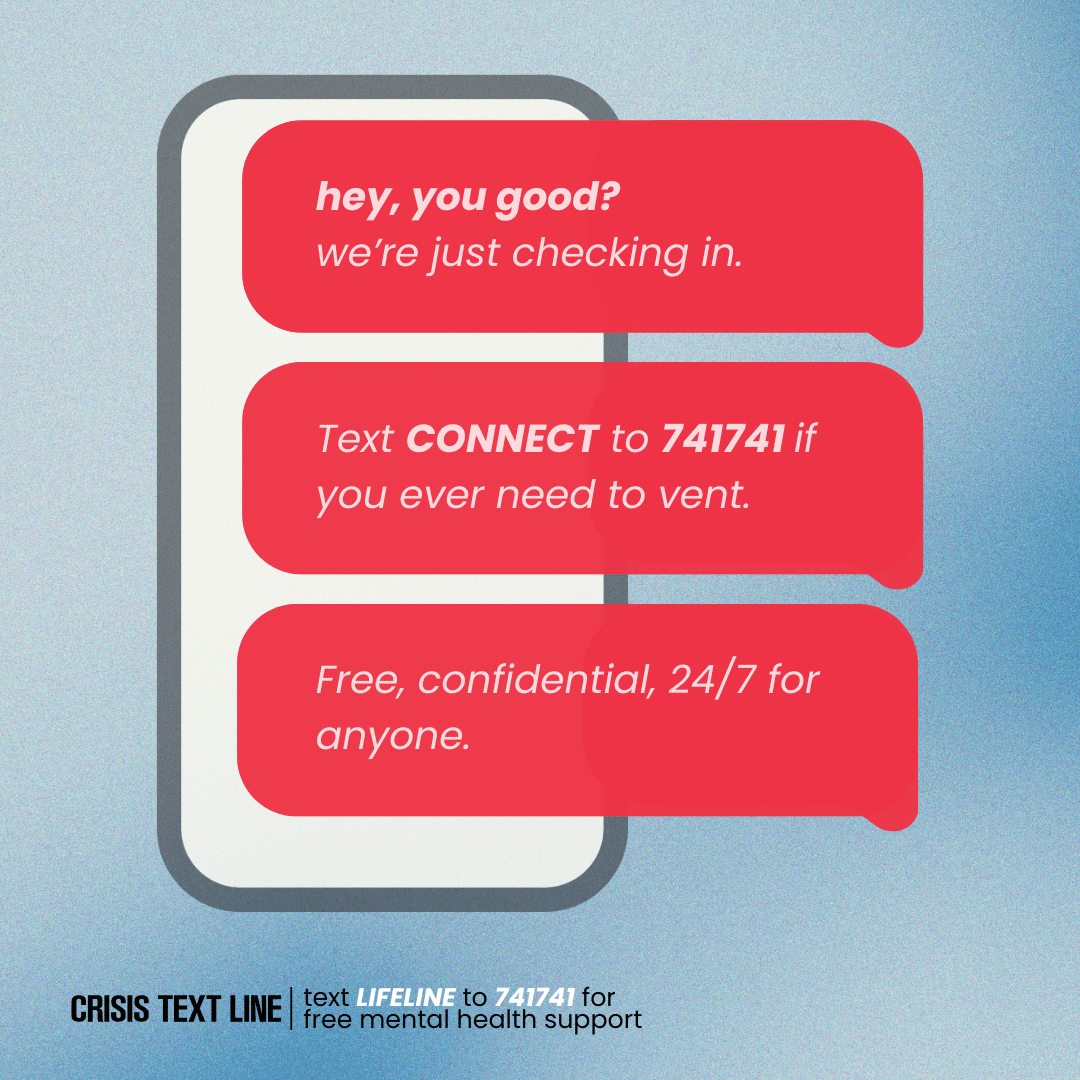Suicide

How to Deal with Suicide
Text CONNECT to 741741 for free, confidential support from a trained volunteer Crisis Counselor, available 24/7.
You are enough. You matter. Your life is worth fighting for. According to the Centers for disease control and prevention (CDC), suicide is a leading cause of death and affects people of all ages, but it’s also preventable. In the U.S. alone, nearly 45,000 lives could be saved every year with the right support and resources.
If you feel like ending your life, it’s brave to ask for help managing your emotions. You are valuable. You are important. And, the world needs you here.
How to Get Help If You’re Thinking About Ending Your Life #
First and foremost–you matter. You bring light into this world. It’s okay to ask for help. And, we’re here for you.
Here are a few ways to get through the next second, minute, hour, and even a whole day.
- Text us. We’re here for you—always. Text CONNECT to 741741 to connect with a real human who is a trained volunteer Crisis Counselor. No judgment—just support.
- Reach out to someone you trust. No matter how alone you feel, know that there are so many people who want you in this world. Confiding in someone can help you build a support system for times when you are feeling in a really dark place. Nervous about reaching out? Start with a text message like this: “Hey there. I’m feeling really alone right now. Would you mind keeping me company?”
- Distract yourself with meaningful activities. Find even one thing that brings you joy. And, hold onto it. Maybe it’s listening to your favorite song (listening to music is one of the most common coping tools for our texters), or maybe it’s looking into the eyes of your sweet child. Whatever it may be, find one thing to turn to when you feel in the darkest of places.
- Talk to a professional. If you are thinking about ending your life, chances are you are dealing with really painful emotions. Nobody deserves to feel that way, and we are so sorry you do. Reach out to a therapist who can help you work through and process your emotions in a healthy way.
- Go somewhere safe and seek immediate help. If you feel like you are a danger to yourself, go somewhere where you can get immediate mental health support like urgent care, an emergency room, or dial 911.
Warning Signs of Suicide #
Sometimes, thoughts of suicide are the result of underlying mental illnesses such as anxiety and depression. Make no mistake, though, not everyone who has a mental illness is suicidal. And, not everyone who contemplates suicide has a mental illness.
When someone is contemplating suicide, they may show changes in the way they act, think, or behave.
Suicidal Behavior: What People Contemplating Suicide Might Say #
Someone with suicidal thoughts may talk about:
- A desire to end their life
- Hopelessness
- Having no reason to live
- Being a burden to others
- Feeling trapped
- Unbearable pain (physical or emotional)
Suicidal Behavior: What People Contemplating Suicide Might Do #
Someone actively contemplating suicide may act impulsively or recklessly. It might look like:
- Increased use of alcohol or drugs
- Looking for ways to end their lives, including searching online for possible methods
- Withdrawing from activities
- Isolating themselves from family, friends, and loved ones
- Sleeping too much or too little
- Saying goodbye to others
- Giving away valued possessions
- Acting aggressively or impulsively
Crisis Text Line is dedicated to helping those who are contemplating suicide. We can help if you or someone you know is thinking about ending their life. Text a Crisis Counselor at 741741, or use the mobile text button below to text from your phone. We’re here to support you.
Understanding Suicide Risk Factors #
The world around us impacts how everyone thinks and behaves. We would love to stay in a safe bubble but that is simply not possible. Both external factors (like relationship challenges, work stress, or trauma) and internal factors (like trouble regulating and processing emotions) can increase the risk of suicide.
INTERNAL FACTORS
Some of the health factors that can leave a person at a higher suicide risk include mental and physical health conditions such as:
- Depression
- Addiction or substance abuse
- Bipolar disorder
- Schizophrenia
- Anxiety or PTSD
- Chronic pain or other serious health condition
- Traumatic brain injury
EXTERNAL FACTORS
Several circumstances in a person’s world can increase their likelihood of a suicide attempt. These include:
- Access to lethal means like guns or pills
- Prolonged stress from work, relationships, or financial hardship
- Stressful life events or traumatic life changes
- Someone else’s suicide, a loved one or even a celebrity or character
LIVED EXPERIENCES
Personal connections to suicide or trauma can greatly increase someone’s risk of suicide. Three key risk factors experts and mental health professionals look for are:
- Previous suicide attempts
- Family history of suicide
- Childhood abuse, neglect, or trauma
How You Can Help Prevent Suicide #
As stated earlier, suicide is preventable. But, how? With your help.
We all have our hard stuff. If you have a friend who is contemplating suicide, it’s undeniably hard—for them and for you. Sometimes, preventing suicide comes down to having tough conversations with the people who matter to you. So, let’s face this challenge head on—together. You can be the lifeline someone needs.
Here are some tips for starting a conversation:
- Listen. The most important thing you can do is let the person know that you are available to listen and hear about what is going on in their brain without judgement.
- Ask how you can help. Give the power back to the person that’s struggling. Ask how you can be helpful, whether it’s sitting with them when they’re lonely or helping them choose a doctor.
- Keep it casual but caring. This is a friend you care about, and we’re here to support. Follow our Always Ask steps to guide you through the conversation. Grab a cup of coffee, invite them over for the best Netflix binge, or host a study date and mention that you’re concerned to begin the conversation. Totally cool. Totally casual.
- Be patient. Let them open up at their pace. If they’re not ready to talk, let them know that you’re here to listen whenever they’re ready.
- Encourage them to reach out for support. We are here for everyone. Encourage them to text 741741 if they need help. You could even help them save the number in their phone for whenever they are in a hot moment. That way, even when you are not there, we can help them get to a cool calm.
There is support for everyone. There is support for you. We are all in this big, brave world together.
Frequently Asked Questions About Suicide #
Spread the Word! Provide 741741 to a Friend #
You never know who might need Crisis Text Line. Pass it on and tell the people in your life to text CONNECT to 741741 if they’re ever in crisis.
Table of contents

Looking to make an impact? You can help change and save lives, one text at a time.
Volunteer Virtually at Crisis Text Line



